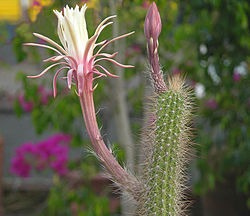Peniocereus
| Habit | cacti-succulent |
|---|
If this plant info box on watering; zones; height; etc. is mostly empty you can click on the edit tab and fill in the blanks!
Peniocereus is a genus of vining cacti, comprising about 18 species, found from the southwestern United States and Mexico. They have a large underground tuber, thin and inconspicuous stems.
Read about Peniocereus in the Standard Cyclopedia of Horticulture
|
|---|
|
Nyctocereus (night and cereus). Cactaceae. A slender cactus, at first erect, then clambering, with few branches; the st. has many low ribs with closely set areoles producing 10 or more acicular spines: fls. large, nocturnal, white; tube and ovary covered with small bracts, producing in their axils small clusters of spines: fr. red; seeds black.—Several species are known. They are among the several kinds of night-blooming cereus. See Succulents.
|
Read about Peniocereus in the Standard Cyclopedia of Horticulture
|
|---|
|
Peniocereus (Latin combination, meaning phalloid Cereus). Cactaceae. Low slender erect plants, growing from very large fleshy turnip-shaped roots: sts. usually 4- or 5-ribbed: fls. large, nocturnal, usually white: fr. ovoid, long-acuminate, bright scarlet, edible. CH
|
Cultivation
Propagation
Pests and diseases
Species
Peniocereus greggii - desert nightblooming cereus
Peniocereus marianus
Peniocereus zopilotensis
The following genera have been brought into synonymy with Peniocereus:
- Cullmannia Distefano
- Neoevansia W.T.Marshall
- Nyctocereus (A.Berger) Britton & Rose
Gallery
References
- Standard Cyclopedia of Horticulture, by L. H. Bailey, MacMillan Co., 1963
External links
- w:Peniocereus. Some of the material on this page may be from Wikipedia, under the Creative Commons license.
- Peniocereus QR Code (Size 50, 100, 200, 500)
